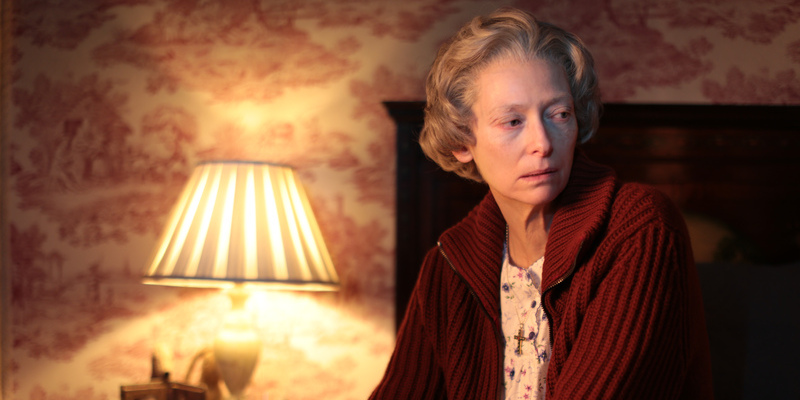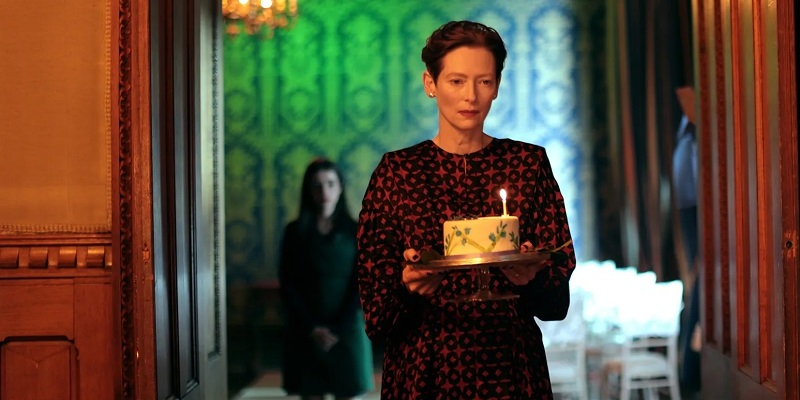
Review by
Eric Hillis
Directed by: Joanna Hogg
Starring: Tilda Swinton, Carly-Sophia Davies, Joseph Mydell, Alfie Sankey-Green

Once your parents reach a certain age you begin to worry about them as
if they were your own children. Is Dad getting enough exercise? Is Mum
eating properly? And of course that most nebulous of questions: are they
happy? The truth is, happiness is for the young. Once you reach a
certain age you become content with… well, with being content. Happiness
is too hard to define, and when you experience it it's usually fleeting,
something that strikes you when it's too late, like finally appreciating
the sun on the last day of summer. When we reach a certain age our
children want us to be happy, because we wanted them to be happy. But
what our children don't realise is that it was a fraudulent and largely
selfish wish on our part. As parents we're so invested in ensuring our
children acquire a golden ticket that we often miss the simple pleasure
of watching them enjoy the chocolate. When we reach a certain age, often
after the death of our spouse, our children start to interrogate us,
wishing to finally get to know this enigma that has been present
throughout their life but curiously taken for granted like a clock that
only draws attention once it stops chiming. They want to make us happy,
but we know they can't. It's far too late for all that. But we can be
content in their presence.
In writer/director Joanna Hogg's
The Eternal Daughter, shot in secret during the COVID pandemic, Tilda Swinton plays
the dual roles of an elderly woman, Rosalind, and her fortysomething
daughter Julie. Her father having recently passed, Julie is determined
to get to know her mother while she still has the opportunity, and so
she takes her for a stay at a remote hotel which was once a stately home
where Rosalind spent much of her youth. Julie has an ulterior motive:
she's a filmmaker who hopes the location will bring back good memories
for her mother, which she can slyly record on her smartphone to later
reconstitute as a film script.

If physical spaces do indeed hold memories as though they were
recording devices (as suggested by Nigel Kneale's
The Stone Tape, one of several classic supernaturally tinged British TV productions
Hogg's evokes), it's foolish to think only positive memories would be
held between their walls. Rosalind does have fond recollections, but
returning to the house reminds her of darker chapters of her life.
Seeing her mother upset (one of the most horrific things a son or
daughter can witness) by her good intentions causes Julie to crumble,
feeling guilty about exploiting her mother for her art.
Coming off a pair of highly autobiographical movies in
The Souvenir Parts 1
and
2, might Hogg be examining her own discomfort at dredging up her
family's past? Or perhaps in attempting to represent her own mother
(played by Swinton in the Souvenir films) in her work, Hogg discovered,
as so many of us do when it's too late, that she never really knew the
woman. In a key scene, Julie becomes distressed when her mother refuses
to eat anything at dinner time. "You choose something lovely," Rosalind
insists, "and I'll enjoy watching you eat it." Julie mistakes the
gesture as one of stubborn martyrdom on her mother's part. She can't
understand that all parents want is to see their children be
happy.

When an actor is placed on a pedestal it can be all too easy to take
them for granted. "Swinton is superb" is the sort of pronouncement that
provokes retorts of "well, duh" or "no shit Sherlock," but she really is
remarkable here. Until a key moment late on, Hogg resolutely avoids
employing any visual effects trickery to place Julie and Rosalind in a
shared frame. The absence of such effects in a 21st century movie draws
attention to itself and threatens to break the artifice. But Swinton is
so convincing in both roles that we forget about the conceit until it's
broken at a pivotal point near the film's conclusion. Jim Jarmusch was
onto something when he cast Swinton as a vampire, as the actress doesn't
seem to age like the rest of us, and with relatively minimal makeup
she's easily transformed into two women who are 20 years younger and
older than herself.
While this is essentially a drama about a woman trying to spend some
quality time with her mother, it's dressed up in the trappings of a
classic ghost story. In the opening scene a cabbie tells the women a
story about an apparition appearing in the background of a wedding photo
taken at the hotel. Wind whistles through keyholes, windows bang in the
night, Rosalind's dog whimpers at an unseen presence, gargoyles peer
menacingly from rooftops, and the hotel and its grounds are constantly
shrouded in fog. The location recalls such BBC productions as
Whistle and I'll Come to You and
The Green Man.

There are hints that all is not as it seems. The hotel receptionist (Carly Sophia-Davies) initially comes off as rude and disinterested but grows increasingly
uncomfortable in Julie's presence. There are Pazuzu-esque inserts of
Rosalind aged like Ursula Andress at the end of She. People and animals appear in places they shouldn't be.
Seasoned viewers will predict where this is going but the final
revelation is less of a twist and more of an inevitability. How this all
ends is moot; it's about the time we get to spend with these two women,
neither of whom are particularly remarkable, which makes their
relationship all the more affecting. Like our mothers, Swinton and Hogg
won’t be around forever. Cherish them while you can.


